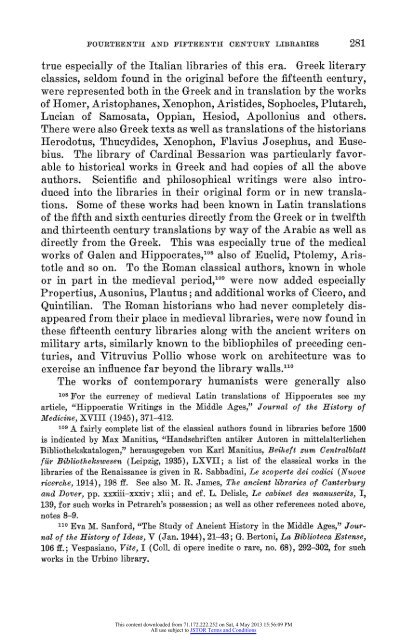The Intellectual Interests Reflected in Libraries of the Fourteenth and ...
The Intellectual Interests Reflected in Libraries of the Fourteenth and ...
The Intellectual Interests Reflected in Libraries of the Fourteenth and ...
Create successful ePaper yourself
Turn your PDF publications into a flip-book with our unique Google optimized e-Paper software.
FOURTEENTH AND FIFTEENTH CENTURY LIBRARIES 281<br />
true especially <strong>of</strong> <strong>the</strong> Italian libraries <strong>of</strong> this era. Greek literary<br />
classics, seldom found <strong>in</strong> <strong>the</strong> orig<strong>in</strong>al before <strong>the</strong> fifteenth century,<br />
were represented both <strong>in</strong> <strong>the</strong> Greek <strong>and</strong> <strong>in</strong> translation by <strong>the</strong> works<br />
<strong>of</strong> Homer, Aristophanes, Xenophon, Aristides, Sophocles, Plutarch,<br />
Lucian <strong>of</strong> Samosata, Oppian, Hesiod, Apollonius <strong>and</strong> o<strong>the</strong>rs.<br />
<strong>The</strong>re were also Greek texts as well as translations <strong>of</strong> <strong>the</strong> historians<br />
Herodotus, Thucydides, Xenophon, Flavius Josephus, <strong>and</strong> Eusebius.<br />
<strong>The</strong> library <strong>of</strong> Card<strong>in</strong>al Bessarion was particularly favorable<br />
to historical works <strong>in</strong> Greek <strong>and</strong> had copies <strong>of</strong> all <strong>the</strong> above<br />
authors. Scientific <strong>and</strong> philosophical writ<strong>in</strong>gs were also <strong>in</strong>troduced<br />
<strong>in</strong>to <strong>the</strong> libraries <strong>in</strong> <strong>the</strong>ir orig<strong>in</strong>al form or <strong>in</strong> new translations.<br />
Some <strong>of</strong> <strong>the</strong>se works had been known <strong>in</strong> Lat<strong>in</strong> translations<br />
<strong>of</strong> <strong>the</strong> fifth <strong>and</strong> sixth centuries directly from <strong>the</strong> Greek or <strong>in</strong> twelfth<br />
<strong>and</strong> thirteenth century translations by way <strong>of</strong> <strong>the</strong> Arabic as well as<br />
directly from <strong>the</strong> Greek. This was especially true <strong>of</strong> <strong>the</strong> medical<br />
works <strong>of</strong> Galen <strong>and</strong> Hippocrates,'08 also <strong>of</strong> Euclid, Ptolemy, Aristotle<br />
<strong>and</strong> so on. To <strong>the</strong> Roman classical authors, known <strong>in</strong> whole<br />
or <strong>in</strong> part <strong>in</strong> <strong>the</strong> medieval period,'09 were now added especially<br />
Propertius, Ausonius, Plautus; <strong>and</strong> additional works <strong>of</strong> Cicero, <strong>and</strong><br />
Qu<strong>in</strong>tilian. <strong>The</strong> Roman historians who had never completely disappeared<br />
from <strong>the</strong>ir place <strong>in</strong> medieval libraries, were now found <strong>in</strong><br />
<strong>the</strong>se fifteenth century libraries along with <strong>the</strong> ancient writers on<br />
military arts, similarly known to <strong>the</strong> bibliophiles <strong>of</strong> preced<strong>in</strong>g centuries,<br />
<strong>and</strong> Vitruvius Pollio whose work on architecture was to<br />
exercise an <strong>in</strong>fluence far beyond <strong>the</strong> library walls.1'0<br />
<strong>The</strong> works <strong>of</strong> contemporary humanists were generally also<br />
108 For <strong>the</strong> currency <strong>of</strong> medieval Lat<strong>in</strong> translations <strong>of</strong> Hippocrates see my<br />
article, "Hippocratic Writ<strong>in</strong>gs <strong>in</strong> <strong>the</strong> Middle Ages," Journal <strong>of</strong> <strong>the</strong> History <strong>of</strong><br />
Medic<strong>in</strong>e, XVIII (1945), 371-412.<br />
109 A fairly complete list <strong>of</strong> <strong>the</strong> classical authors found <strong>in</strong> libraries before 1500<br />
is <strong>in</strong>dicated by Max Manitius, "H<strong>and</strong>schriften antiker Autoren <strong>in</strong> mittelalterlichen<br />
Biblio<strong>the</strong>kskatalogen," herausgegeben von Karl Manitius, Beiheft zum Centralblatt<br />
filr Biblio<strong>the</strong>kswesen (Leipzig, 1935), LXVII; a list <strong>of</strong> <strong>the</strong> classical works <strong>in</strong> <strong>the</strong><br />
libraries <strong>of</strong> <strong>the</strong> Renaissance is given <strong>in</strong> R. Sabbad<strong>in</strong>i, Le scoperte dei codici (Nuove<br />
ricerche, 1914), 198 ff. See also M. R. James, <strong>The</strong> ancient libraries <strong>of</strong> Canterbury<br />
<strong>and</strong> Dover, pp. xxxiii-xxxiv; xlii; <strong>and</strong> cf. L. Delisle, Le cab<strong>in</strong>et des manuscrits, I,<br />
139, for such works <strong>in</strong> Petrarch's possession; as well as o<strong>the</strong>r references noted above,<br />
notes 8-9.<br />
110 Eva M. Sanford, "<strong>The</strong> Study <strong>of</strong> Ancient History <strong>in</strong> <strong>the</strong> Middle Ages," Journal<br />
<strong>of</strong> <strong>the</strong> History <strong>of</strong> Ideas, V (Jan. 1944), 21-43; G. Bertoni, La Biblioteca Estense,<br />
106 ff.; Vespasiano, Vite, I (Coll. di opere <strong>in</strong>edite o rare, no. 68), 292-302, for such<br />
works <strong>in</strong> <strong>the</strong> Urb<strong>in</strong>o library.<br />
This content downloaded from 71.172.222.252 on Sat, 4 May 2013 15:56:09 PM<br />
All use subject to JSTOR Terms <strong>and</strong> Conditions

















